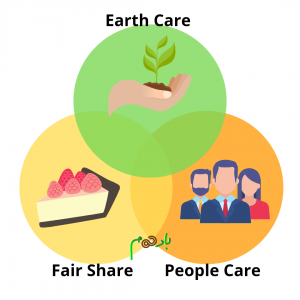What is permaculture?
In 1978, Bill Mollison (ecological researcher) and David Holmgren (writer) developed the word permaculture by combining the words permanent and agriculture in his book called “permaculture one”. The two words have distinctive meanings, but they come together to create the meaning of sustainable agriculture. But this was quickly expanded to also stand for permanent and culture as it was seen that social aspects were an integral part of a truly sustainable system.
“The conscious design and maintenance of agriculturally productive systems that have the diversity, stability, and resilience of natural ecosystems. It is the harmonious integration of the landscape with people providing their food, energy, shelter, and other material and non-material needs in a sustainable way.” .
Bill Mollison
Permaculture is Mary Poppins’ bag full of bright ideas for living sustainably. In layman’s terms, permaculture works alongside nature rather than contradicts it. Permaculture experts simulate or directly utilize natural patterns as models by observing natural processes for sustainable human designs.

What are the three ethics of permaculture?
At its heart are three ethics:
- Care for the planet.
- Care for people.
- Fair share.
we have ethics, “we have morality” .
Bill Mollison
These ethics are usually portrayed as a Venn diagram to remind us that we intend to design to hit the Reuleaux triangle.
Care for the planet:
Planet earth is the mother that takes care of us by providing us with energy resources, air to breathe, shelter to feel safe, and food to survive. This ethic reminds us that not only our design must not endanger the health of our planet, locally or globally, but also it should benefit other life forms. Each organism has its inherent value; even if we find them impractical, we must take care of them.y
As a permaculture pro, you should always answer these questions before taking any action:
- What is nature’s solution to this issue?
- Does it benefit the ecosystem, or is it against it?
Taking care of the planet can also mean taking care of the soil. Healthy soil can provide us with healthy air, clean water, and profitable lands. One of the easiest ways to evaluate the well-being of the soil is soil analysis.
Care for people:
Care for people is based on the belief that we are all connected and have a role in creating a healthy and sustainable world. This ethic calls on us to design systems that meet the basic needs of all people while respecting the rights of other people and the natural world. We work to create a just, equitable, and sustainable world for all. Care for people is intertwined with care for the earth. There is a clear need for environmental restoration if we are to continue feeding the world’s population. Without restoring our soils, sequestering carbon emissions, and returning to localized food production, we will quickly exhaust the planet’s resources. Permaculture offers a way to achieve this, but it is also vital that we promote grassroots sovereignty and control over food production, combined with cultural revitalization and a connection to traditional roots.
Fair share:
The fair share ethic is a way of living in harmony with the Earth’s resources. It states that we should take only what we need and leave the rest for others. This ethic is based on the premise that the Earth is a finite system and that we must all share the resources it provides. By taking only our fair share, we can ensure that there is enough for everyone.
12 Permaculture principles:
In 2002, Holmgren published a list containing 12 principles:
- Observe and interact
- Catch and store energy
- Obtain a yield
- Apply self-regulation and accept feedback
- Produce no waste
- Use renewable resources and services
- Design from pattern to detail
- Integrate rather than segregate
- Use small and slow solutions
- Use and value diversity
- Use edges and value the marginal
- [Creatively use and respond to change [1
These principles guarantee that ethics are used in suitable ways. They are seen as widespread, even though the strategies utilized to precise them will change enormously agree on the location and circumstances. They apply to every aspect of our lives, from agriculture to economy, education, and technology.
Here are some examples of some of the principles:
Observe and interact:
To meaningfully observe, permaculture suggests that we slow down and pay attention to the details of what we can see and hear around us. By doing this, we can get an understanding of the larger picture. Permaculture practitioners, spend a bulk of their time observing their site’s performance and take other people’s experiences into account to make an informed decision and have a clue of what kind of challenges and opportunities are ahead of them.
Use small and slow solutions:
Permaculture realizes that not every problem has an instant solution. Just because a goal can be time-consuming, it doesn’t mean we should postpone it or pack it in. For instance, It might be stating the obvious to say that converting to organic farming is not going to happen overnight, according to Earthbound farm it takes three years to transition ground from conventional to organic, but this shouldn’t stop us from taking little steps on the path of this international demand.
Creatively Use and Respond to Change
It is an expected fact that change is inevitable. However, how we react to change can be under our control. Permaculture dictates that we design for known changes. For example, if you want to plant something the least you can do is take season change and succession into consideration while planning.
Wrap up
To sum up, Permaculture ethics and principles guide our actions and help us to live in harmony with nature. We should all think about what these mean to us and how we can apply them in our lives. We can make the transition from being dependent consumers to becoming responsible producers by adopting ethics and applying these principles in our daily life. if you have any experience in permaculture or have used any of the principles in your life make sure to share your experience with us in the comment section.




